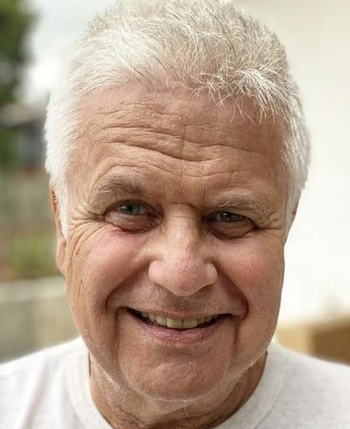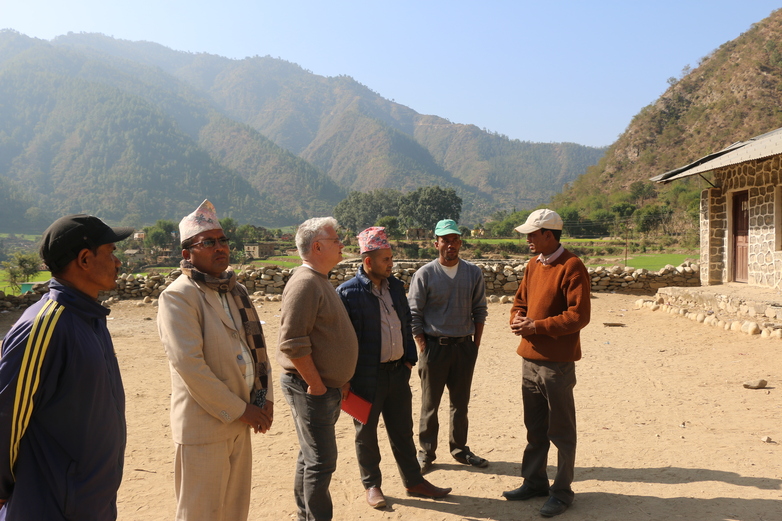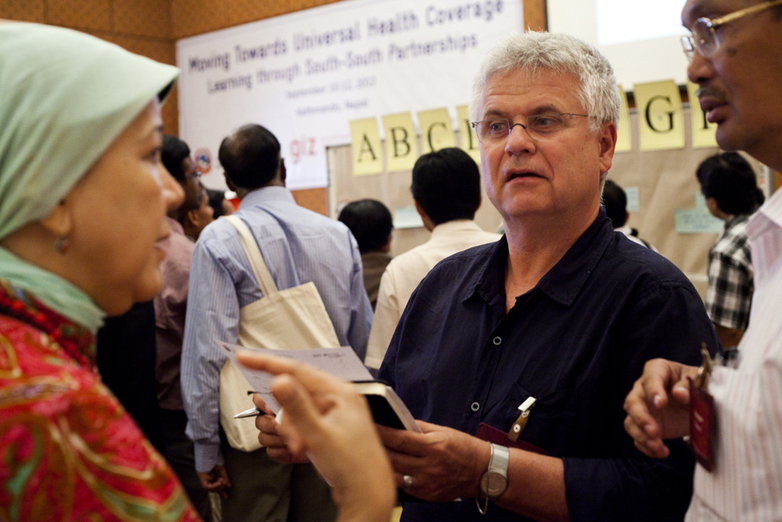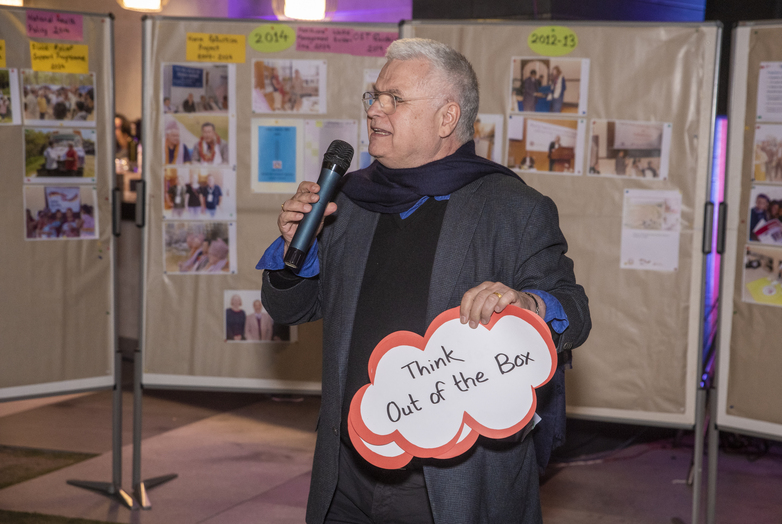
18.01.2022
Interview: ‘My boss said I was mad’
In a globalised world, diseases can quickly become a global problem. How can international cooperation contribute to health worldwide? A conversation with doctor and GIZ health expert, Paul Rückert.

Mr Rückert, it is very clear now, not least because of the coronavirus pandemic, that health in a globalised world is an issue that affects every one of us. Was this notion also important in development cooperation 30 years ago, when you started with GIZ in Pakistan?
Of course, it was already the case back then that a cholera outbreak in one country would lead to outbreaks in other countries. But the term global health didn’t exist at the time. That only came into use later. More important is the attitude that underpins the term: it’s not about the supposedly developed industrial nations doing a bit of charity work in poorer countries. Thanks to globalisation, we’re all in the same boat. We all depend on each other. If we want everybody around the world to be healthy, we have to work with our partner countries on an equal footing; we must cooperate with other disciplines and solve health problems collectively.
How can international cooperation contribute to that?
Global health requires a lot of expertise and a different kind of cooperation at global level. It’s here that international cooperation, especially an organisation like GIZ, can make an important contribution. For one thing, we can provide advice in the field of health diplomacy, for example on the development of policy directives and sectoral guidelines.
Another area is coordination: GIZ can coordinate programmes, not only at country level, but also regionally and globally, and between different sectors, as well, because of our involvement with international and multilateral organisations on behalf of our commissioning parties. Within GIZ, too, we’ve learned that we can only succeed with health if different sectors cooperate. For example, linking health to the environment or social security.
And thirdly, there’s the question of what we do at country level. After all, it should be possible to comply with the guidelines and act upon them. To achieve reforms, we need to work together with our partners in close, consistent and trusting exchanges, and in a shared learning process.
Where do you see the strengths of GIZ here – especially since the 2011 merger of the three predecessor organisations DED, GTZ and InWEnt?
GIZ works in over 120 countries so it benefits from employing or knowing international and national experts on the ground. Moreover, in many countries we have a systemic approach. This means we advise policymakers and administrators on a range of issues, but we also work alongside NGOs directly with local people, for example in hospitals.
Since the merger, there have been significant improvements in how the different approaches interact. Overall, GIZ has a diverse workforce that offers a varied array of skills and experiences, so for each project we can put together an ideal team. Besides the traditional advisors, this includes development workers and integrated experts, who work very closely with our partner organisations – even being placed with them like employees, sometimes. That sets us apart from other organisations.

How has international cooperation in the health sector evolved in recent years?
The people who worked in the health sector 30 years ago wanted to work hands-on, helping people on the ground with money, personnel, medicines and equipment. At that time, we often worked in pilot projects, first addressing a small model region, which ideally would then become the standard for the whole country. This was change from the bottom up, from local project work up to national health policy. Today, work in the health sector is much more political. The sustainable impact of interventions has become increasingly important. That’s a change that occurred over many decades.
Do you have an example of that kind of sustainability?
It was always important to me to see if we could introduce something that would help the whole country. In 1999, we started working with the government in Indonesia to change the health care system – in an enormous country, which at the time had a population of 250 million. This included developing new social security legislation. My boss at the time said I was mad and asked me if I had ever written a law before. He said that was a job for the World Bank, the World Health Organization and other institutions, not GIZ. But working with our local partners, we did it anyway.
When I started in Indonesia, about 10 per cent of the population had health insurance, with one of four different companies that existed back then. Today the figure is 90 per cent, and there’s only one big insurance company with a turnover of more than EUR 5.3 billion. What's more, it’s not some outside development organisation that’s paying the insurance premiums. People pay their own health insurance premiums, while the state pays the premiums for impoverished citizens. In that way, a self-sustaining system has been set up. Today, that would be comparable to showing a country, or better still a region, how to make vaccines for themselves – rather than just supplying them with vaccines.

How hard was it to implement that project?
You have to understand a country in order to see what changes are needed. At the same time, you have to find the people who can drive change and make it possible. They include policy experts, academics or administration experts, for example. You also have to coax people into wanting reform in the first place. It is very much a matter of sensitivity: where does a country stand? What does the government want and what steps do they still need to take? Just telling them what to do won’t work. It’s important to find the people I just mentioned, on the ground, and to give them professional support so that they can drive the reforms forward. That’s how it was in Indonesia.
Do you see any weaknesses in international cooperation today when it comes to global health?
Certain topics are fashionable. Mother-and-child health, for instance: in almost every country there are at least five organisations working on that. What’s often missing is coordination between the different organisations. I mean each organisation develops its own guideline, its own approach; there’s not much coordination – that stands in the way of the reforms that would make these very organisations redundant. We have always tried to work more closely with others. This leads, quite simply, to more independence and a greater sense of responsibility on the part of the partner organisations.

You said earlier that global health is about working together on equal terms. What can Germany learn from other countries?
Digitalisation is much more advanced in many developing countries than in Germany. In Cambodia, in March 2021 I was already given a digitally readable vaccination passport. Health data is recorded much more systematically in these countries – and not just for COVID-19.
Is that because of the strict data protection laws in Germany?
Data protection is not an obstacle to digitalisation; on the contrary, in the health sector digitalisation would actually be impossible without the protection of people’s privacy. In many countries there is still a lack of effective legislation. But when we work together as GIZ, of course we always expect to guarantee data security. Germany has effective laws, but it sometimes has difficulties finding solutions that can be implemented quickly. Incidentally, it doesn’t always have to be the case that one country is further ahead than the other. We can also learn from each other because we are asking ourselves the same questions.
Profile: Paul Rückert, 66, has a doctorate in medicine and is a graduate of the renowned Johns Hopkins University in Baltimore, USA. From 1994, he worked as a global health expert for the Deutsche Gesellschaft für Internationale Zusammenarbeit (GIZ) GmbH in Pakistan, Indonesia, Bangladesh, Nepal and Cambodia. It wasn’t his dream job at first, but then it took hold of him. And he stayed – until his retirement.
